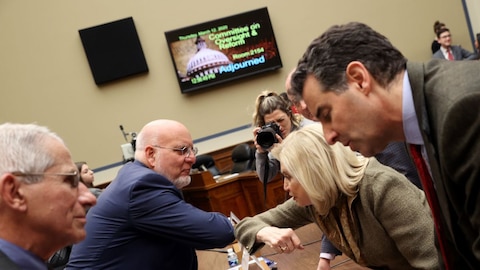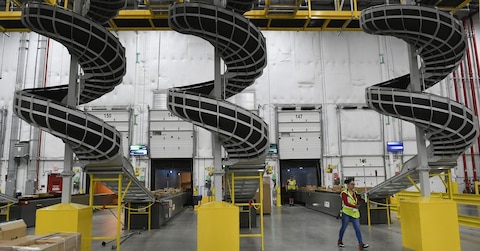Analysis | The Technology 202: Coronavirus could change how social networks approach public health – The Washington Post
with Tonya Riley
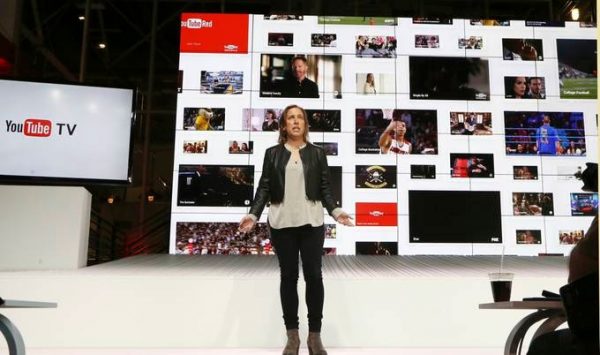
YouTube CEO Susan Wojcicki. (Reed Saxon/AP)
Ctrl + N
The coronavirus is transforming how social networks approach public health, and some of those changes will persist even after the pandemic is over.
YouTube chief executive Susan Wojcicki told CNN that the virus has been “an acceleration of our digital lives.” It’s also accelerating changes at the video-streaming service, which is now doing more to spread authoritative public health information — changes Wojcicki said may have otherwise been years away.
“Certainly this has been a big acceleration of working with established public health officials to get the right information online to users, and we’re seeing that opportunity,” she told Brian Stetler in one of her first interviews since the virus dramatically altered American life.
YouTube has been displaying an information box on many videos and searches related to covid-19, directing viewers to the Centers for Disease Control and Prevention or other global public health agencies.
The pandemic could mark an inflection point in how the tech giants more broadly address misinformation in the future.
“Tiny changes are happening again now, under pressure, and specific to the moment,” the Atlantic’s Kaitlyn Tiffany writes.
“We could see hundreds more incremental changes in the months to come, all of which will make the Internet a better place long after the crisis is over.”
This isn’t the first time the industry had to undertake a major overhaul in the face of a crisis, James Grimmelmann, an Internet policy expert at Cornell Law School, told Kaitlyn.
For instance, many of the companies made changes to live-streaming video on their platforms to prevent another situation such as the Christchurch massacre. And the revelations of Russian interference on social media in the 2016 election contributed to a major overhaul in how the companies approach political ads and fact-checking.
“I think we’re getting a similar scaling up in terms of the dissemination of public-health information,” Grimmelmann said. “Some platforms are familiar with these challenges; some of them are learning.”
The bigger companies have an advantage — and more power to make sure authorities’ messages are reaching the public.
They’re wielding their broad reach in new ways. Instagram chief Adam Mosseri, who also appeared on Stetler’s show, said the Instagram app is now directing people to healthcare.gov to see what their options are if they recently lost their employer-provided health insurance. He said the company has also been directing small businesses to do the same.
“It’s not our bread and butter, but we think it’s an important time right now for us to do everything we can,” Mosseri said. “Often the most important things for people or for business are the large government-based stimulus programs, coverage programs, etc.”
They also recognized that covid-19 misinformation was a problem quickly – which made this different from their response to political interference. YouTube has been adjusting its policies to make sure it’s blocking the latest falsehoods gaining traction online. For instance, the company recently prohibited videos making false claims that 5G is the source of the coronavirus.
“What was really unique about this was how fast-moving the covid-19 crisis was,” Wojicki said.
But actually enforcing these policies and removing the videos is a major challenge. Especially because the crisis forced the companies to send many of their content moderators home. YouTube and Facebook have been relying more on machines to do content moderation, which are not yet as equipped as people to make difficult decisions about what posts violate company policies.
The companies have acknowledged this could lead to more mistakes, both in leaving up content that should be removed and over policing posts that don’t break the rules. That could cause major problems as more people are spending more time online while stuck at home.
BITS, NIBBLES AND BYTES
BITS: Facebook groups urging users in Wisconsin, Ohio, Pennsylvania and New York to protest quarantine measures are the work of online guns rights activists, my colleagues Isaac Stanley-Becker and Tony Romm report. The groups suggest that “seemingly organic demonstrations are being engineered by a network of conservative activists,” they write.
The groups provide a powerful online image of grass-roots dissent, even as polls suggest Republican opposition to stay-at-home orders is just around 30 percent. The groups, which have over 200,000 members combined, gained steam after President Trump supported such protests on his Twitter account.
The explosion of online protest groups and events also challenge Facebook’s aggressive stance toward removing coronavirus-related misinformation. Groups such as those identified by The Post provide a hub for misinformation, my colleagues report.
“Unless government prohibits the event during this time, we allow it to be organized on Facebook. For this same reason, events that defy government’s guidance on social distancing aren’t allowed on Facebook,” said Andy Stone, a spokesman for the company.
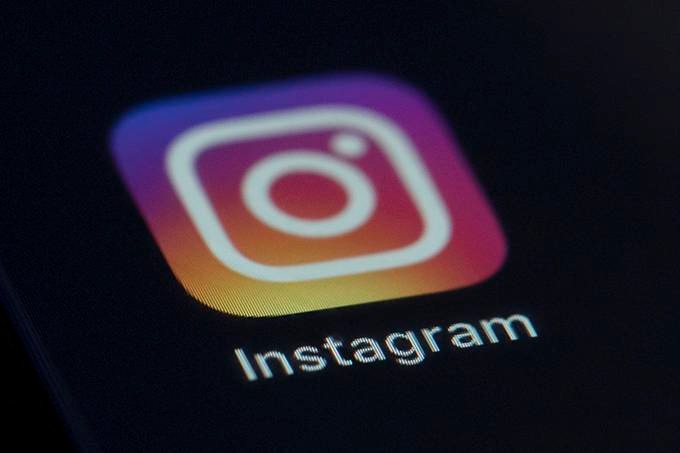
The Instagram app icon. (Jenny Kane/AP)
NIBBLES: The founders of Instagram launched a website that gives live updates on the spread of covid-19 in each U.S. state.
They say the tool will given citizens a better way to assess local threats of infection as the economy reopens, Sarah Frier and Emily Chang at Bloomberg News report. The website, called RT.live, pulls data from a volunteer organization, the Covid Tracking Project. The organization uses a statistical model that assesses the threat of infection based on the average number of people who catch the virus from a single infected person, called an effective reproduction number.
“We’re trying to take what is a complex topic and boil it down to a simple number that anyone can view from their home,” said Kevin Systrom, the co-founder and former chief executive officer of Instagram. “That’s why this dashboard is so important — because it gives you live insight into the effects of the choices we all make.”
This is the first project from Systrom and co-founder Mike Krieger since the pair left Facebook in late 2018 after clashing with chief executive Mark Zuckerberg.
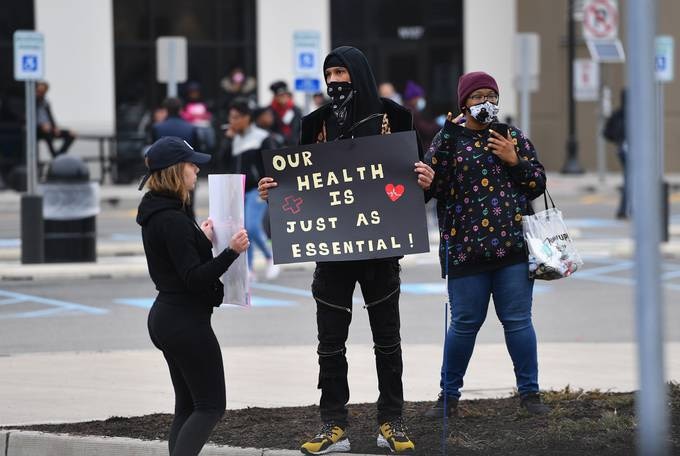
Workers at Amazon’s Staten Island warehouse strike. (Angela Weiss/AFP/Getty Images)
BYTES: The nation’s top labor regulator is looking into allegations that Amazon fired labor leaders for organizing protests against the e-commerce giant’s warehouse conditions.
It’s a rare warning shot from the National Labor Relations Board to Amazon when the company is already under intense scrutiny from activists and lawmakers, Caroline O’Donovan at BuzzFeed News reports.
Workers continue to lead protests at warehouses in cities such as Chicago, where worker Ted Miin alleges that his manager retaliated against him for distributing pamphlets on working conditions. The labor board’s regional director deemed the manager’s behavior unlawful but declined to punish Amazon because the incident was “isolated in nature,” Caroline writes. Three more Chicago workers filed similar complaints last week, which could cause the board to revisit its decision.
The warning puts a spotlight on Amazon’s behavior ahead of a “sickout” protest by employees in its Seattle office this week to protest warehouse working conditions and the firing of two Amazon corporate employees who spoke out against them.
Amazon has said several warehouse employees were fired for violating its policies on social distancing. (Amazon CEO Jeff Bezos owns The Washington Post.)
PUBLIC CLOUD
— Government officials once reluctant to openly tap cellphone data out of fear of public backlash are now rapidly experimenting with how to use the technology to fight the coronavirus, my colleagues Craig Timberg, Elizabeth Dwoskin, Drew Harwell and Tony Romm report.
Health experts say the data could be key in helping nations reopen their economies. But there’s a flip side.
“Privacy advocates caution that the rush to deploy possible technological solutions to a devastating pandemic may be outrunning the public’s understanding of how their data is being collected and used,” they write. “They warn that the apps and other services developed to fight the coronavirus might someday be used by different government authorities to fight crime or monitor political activity.”
— Telecom regulators failed to scrutinize Chinese telecommunications companies that could threaten national security, a Senate panel will allege in a new report.
The lack of oversight allowed for Chinese companies that “present an unacceptable amount of risk” to obtain U.S. licenses, Senate investigators tell Kate O’Keeffe and Drew Fitzgerald at the Wall Street Journal.
The group of regulators, called “Team Telecom,” has already moved to overhaul oversight in recent months. It recently recommended revoking the ability of China’s largest landline provider to operate in the United States, my colleague Ellen Nakashima reported.
A more aggressive approach from the United States could cause retaliation from Beijing, American carriers warned the Senate. But intelligence officials say the benefits outweigh the costs.
—Twitter lost its years-long legal court battle over the right to publish surveillance requests from the United States government.
A federal judge threw out a 2014 lawsuit that the company filed against the Justice Department. Twitter argued the department was violating free speech rights in preventing the social network from publishing the requests, Josh Gerstein at Politico reports.
Twitter said it was disappointed with the court’s decision but added it “will continue to fight for transparency. ”
PRIVATE CLOUD
–- Facebook chief executive Mark Zuckerberg wrote an op-ed in The Post today about how Facebook’s trove of data could help combat the coronavirus. He said a recent symptom survey run by Carnegie Mellon researchers on the platform has had promising early promising results that suggests that it could be used to help predict where the disease will spread.
Facebook is now partnering with University of Maryland to expand the survey globally. He says the company itself can’t access the survey results.
“This is work that social networks are well-situated to do,” Zuckerberg writes. “By distributing surveys to large numbers of people whose identities we know, we can quickly generate enough signal to correct for biases and ensure sampling is done properly.”
“Since we’re all generating data from apps and devices every day, there will likely be many more opportunities to use the aggregate data to benefit public health,” he wrote.
— Sellers are finding plenty of buyers for masks and protective gear on LinkedIn, even as many social media companies crack down on profiteers, Mara Hvistendahl reports for Wired.
“While Amazon and eBay have blocked new listings for certain types of PPE, particularly N95 masks, it has remained possible for brokers to reach potential buyers on LinkedIn through an apparent loophole,” she writes. “By changing their headline or job title to include terms like ‘3M N95’ or ‘surgical masks,’ they ensure that their profiles come up in searches for these terms.”
– More news from the private sector:
Last week saw the U.S. Senate join the ever-growing chorus of federal officials advising staff against using Zoom, with one top official calling the video software a “privacy and security concern.”
Gizmodo
Report: Amazon is using “thermal cameras” to monitor warehouse employees for fevers
Amazon’s warehouse workers feel unsafe amid Covid-19. Amazon’s solution: infrared cameras.
Vox
RANT AND RAVE
Silicon Valley is divided over prominent investor Marc Andreessen’s call for tech talent to rebuild American society in light of the problems highlighted by the coronavirus pandemic.
Many, including Code.org co-founder Ali Partovi, were enthusiastic:
But others, such as journalist Ian Bogost, slammed the investor for failing to mention the role Silicon Valley played in creating the problems outlined in the blog:
The New York Times’s Kevin Roose:
Initialized partner Kim-Mai Cutler hinted at what Andreessen could do from his own Facebook board seat:
#TRENDING
No, the Internet Is Not Good Again
After a few weeks of faith in the possibility of online utopia, the cracks are starting to show.
The Atlantic
Bidet Makers See Their Moment and Scramble to Make a Splash
A global toilet-paper shortage has broken American cultural taboos, but with sudden growth comes new hazards, Christopher Mims writes.
The Wall Street Journal
CHECK-INS
- The Open Technology Institute will host an online event on work-from-home digital security on April 21 at 11:00am.
Have an event you want our readers to know about? Email tonya.riley@washpost.com.

